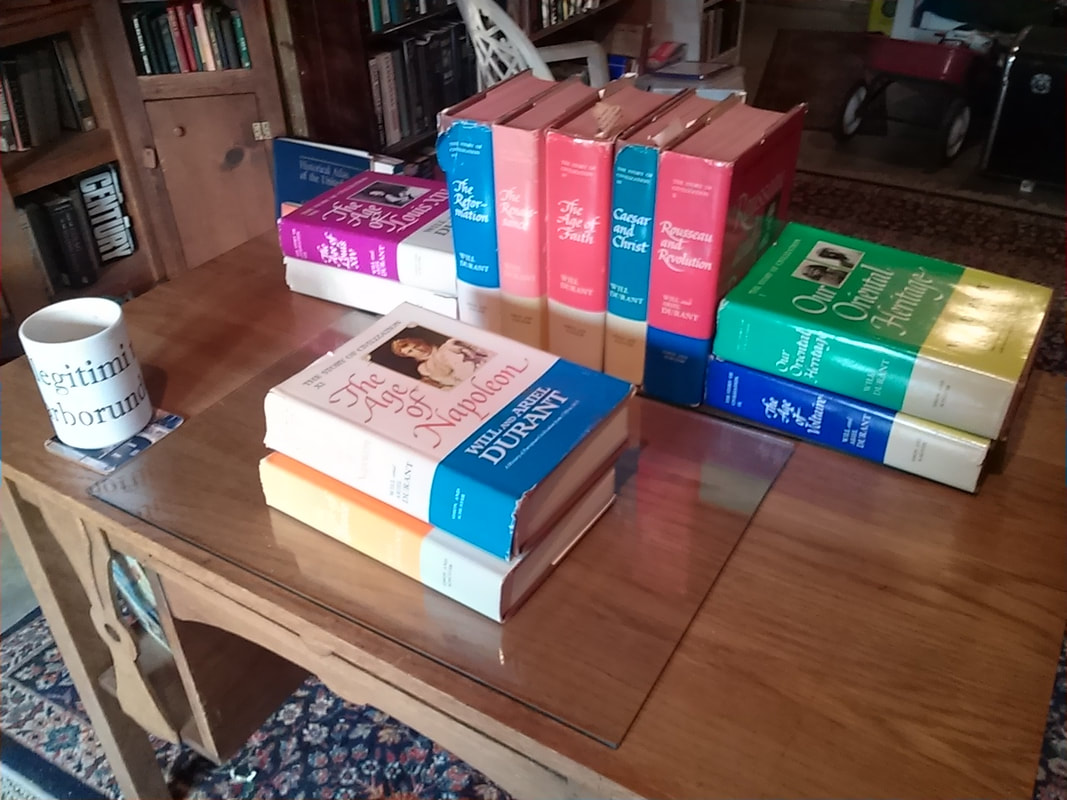On November 30, 2018, I read the final lines of The Age Of Napoleon, the last volume in Will and Ariel Durant’s The Story Of Civilization (TSOC). Last January, I vowed to make my way through these eleven volumes—the set, as I informed readers at that time, weighs 36.6 pounds and runs to 8,945 pages, excluding the bibliography, notes, and index found at the end of each book—and now I have reached that goal.
Here are a few thoughts regarding my march through this history.
Here are a few thoughts regarding my march through this history.
First, some negative observations. TSOC will repel readers for various reasons: its length; its long discourses on philosophers ranging from Socrates to Kant (philosophy was Will Durant’s first love, but I confess I was frequently lost in these discussions, particularly in the last three volumes); the Latinate words—I kept a dictionary close at hand during my reading—and the rolling, rotund prose, closer to the prose of Edward Gibbon than to our current preference for short words and short sentences; the Durants’ generous assumption that readers possess knowledge of certain people and events which in fact they lack.
Several people, all strangers, who have read my articles on TSOC have written to me during this past year, relating that they too might take up or resume reading the Durants, congratulating me on my own attempt, asking questions specific to Durant. Yesterday one of these visitors to this site emailed me a pleasant note with an excellent question: How many readers, this man asked, had actually read all of the Durant books?
Sales figures for the book are available at WikiPedia. (https://en.wikipedia.org/wiki/The_Story_of_Civilization#Reception): two million copies translated into nine languages. (I’m not sure whether that figure means two million books or two million sets.) For a number of years, The Book of the Month Club offered the set at a low price as an enticement for membership, and in 1968 Volume X: Rousseau And Revolution won the Pulitzer Prize for General Non-Fiction.
Of course, sales do not necessarily indicate readers. Perhaps, like the Great Books, readers purchased TSOC and dipped into it from time to time, but used it chiefly to adorn a bookshelf. This was true in my case for over twenty years.
Now, what can we gain by reading Durant? What did I come to admire?
Stay tuned.
Several people, all strangers, who have read my articles on TSOC have written to me during this past year, relating that they too might take up or resume reading the Durants, congratulating me on my own attempt, asking questions specific to Durant. Yesterday one of these visitors to this site emailed me a pleasant note with an excellent question: How many readers, this man asked, had actually read all of the Durant books?
Sales figures for the book are available at WikiPedia. (https://en.wikipedia.org/wiki/The_Story_of_Civilization#Reception): two million copies translated into nine languages. (I’m not sure whether that figure means two million books or two million sets.) For a number of years, The Book of the Month Club offered the set at a low price as an enticement for membership, and in 1968 Volume X: Rousseau And Revolution won the Pulitzer Prize for General Non-Fiction.
Of course, sales do not necessarily indicate readers. Perhaps, like the Great Books, readers purchased TSOC and dipped into it from time to time, but used it chiefly to adorn a bookshelf. This was true in my case for over twenty years.
Now, what can we gain by reading Durant? What did I come to admire?
Stay tuned.






 RSS Feed
RSS Feed